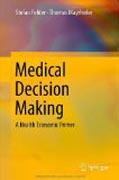
This textbook offers a comprehensive theory of medical decision making under uncertainty, combining informative test theory with the expected utility hypothesis. The book shows how the parameters of Bayes’ theorem can be combined with a value function of health states to arrive at informed test and treatment decisions. The authors distinguish between risk neutral, risk averse and prudent decision makers and demonstrate the effects of risk preferences on physicians’ decisions. They analyze individual tests, multiple tests and endogenous tests where the test result is determined by the decision maker. Finally, the topic is examined in the context of health economics by introducing a trade-off between enjoying health and consuming other goods, so that the extent of treatment and thus the potential improvement in the patient’s health become endogenous. Basic chapters on MDM tools and expected utility theory appeal to studentsof both medicine and economics. A comprehensive text on MDM under uncertaintyfor economists and physicians alike 54 illustrations, 18 boxes and further illustrative materials help the reader to grasp complex issues 31. Exercises andreferences for each chapter provide the opportunity to delve further into thesubject matter. INDICE: 1 Introduction. 2 Basic Tools in Medical Decision Making. 3 Expected Utility, Risk Aversion and Prudence. 4 Treatment Decisions Without Diagnostic Tests. 5 Treatment Decisions with Diagnostic Tests. 6 Treatment Decisions Under Comorbidity Risk. 7 Optimal Strategy for Multiple Diagnostic Tests. 8 TheOptimal Cutoff Point of a Diagnostic Test. 9 A Test's Total Value of Informations. 10 ValuingáHealth and Life. 11 Conclusion.á
- ISBN: 978-3-642-18329-4
- Editorial: Springer Berlin Heidelberg
- Encuadernacion: Cartoné
- Páginas: 250
- Fecha Publicación: 19/04/2011
- Nº Volúmenes: 1
- Idioma: Inglés
